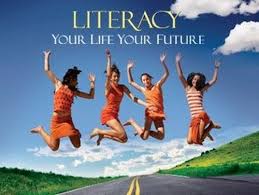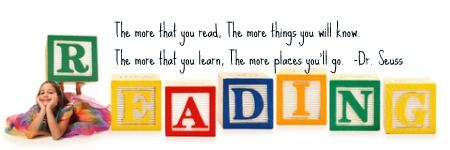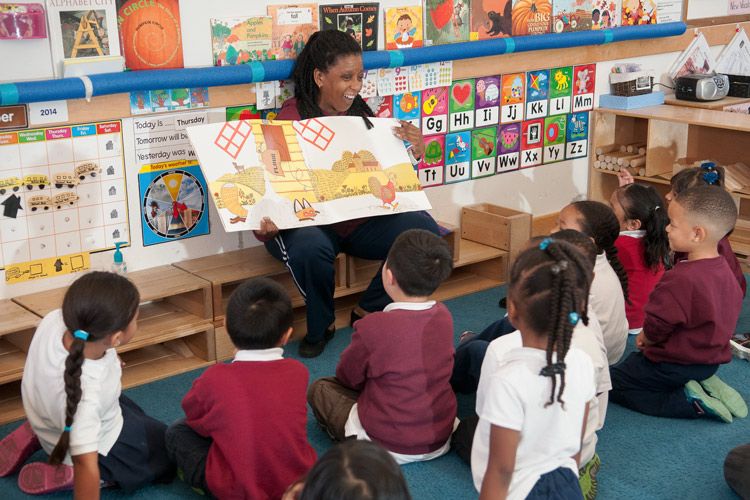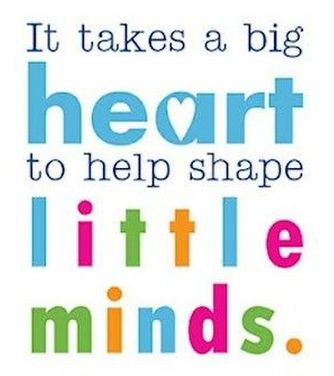Reading, Writing and Read-Alouds
What single skill has one of the biggest effects on a person’s economic status? Perhaps surprisingly, it’s literacy! The statistics are very telling about how much the ability to read and write affects our opportunity to earn a livable wage.
Why is literacy so crucial?
Take a moment to think about what it would be like if you couldn't read or write. How would you function in today's world? Even simple things like reading a menu would be a challenge. This seemingly basic skill that many of us take for granted every day gives us independence, confidence and endless opportunities for success!
The term “literacy” represents the ability to both read and write effectively. While we might think about literacy more in terms of reading for pleasure, it is far more than simply enjoying a good book now and then. Reading fosters critical thinking and expands our view of the world. Early introduction to reading, especially reading aloud, can establish the foundation for language acquisition and proficient literacy skills.
 Reading is also essential to success in many areas of education. What if we could understand the intricate functions of calculus but couldn’t communicate our knowledge? How would we learn about history, science or music without the ability to read?
Reading is also essential to success in many areas of education. What if we could understand the intricate functions of calculus but couldn’t communicate our knowledge? How would we learn about history, science or music without the ability to read?
Literacy extends far beyond just picking up a book for enjoyment. Literacy is essential to thriving in today’s world economically, socially and intellectually.
While this all sounds compelling, unfortunately the statistics about literacy in the US are not encouraging. According to a study conducted recently by the U.S. Department of Education and the National Institute of Literacy, 32 million adults in the U.S. can't read. That's 14 percent of the population. 21 percent of adults in the U.S. read below a 5th grade level, and 19 percent of high school graduates cannot read. Moreover, two-thirds of children who cannot read effectively by grade 4 could end up in poverty or incarcerated.
Our children can’t afford to wait until they begin Kindergarten to start building literacy skills. Considering a child’s brain develops most significantly in the first 3 years of life and nearly 90% of brain development occurs before by age 5, there’s no better time to start building literacy than from the beginning. Let’s give our kids every chance to succeed by engaging and celebrating early literacy.
Reading is fundamental

Books open whole new worlds full of action-packed adventures, fascinating characters and intriguing storylines. Reading can ignite children’s imaginations and take them on journeys of discovery through real and imaginary lands. Where else could we fly to Never-Never Land or eat green eggs and ham?!
Reading is also a pathway to enhancing oral language acquisition. Reading and being read to at an early age can help develop language skills that can have long-term literacy benefits. Beginning at birth and through age 3, the language skills children acquire will enhance their future literacy. The ability to read will also have an impact on academic success in general. The earlier we begin to support these skills for children, the more they will benefit in many aspects of life down the road.
Reading gives a child a chance to not only develop language capabilities but it also encourages their creativity and helps them understand the world around them. Think about all the things we learn from books, beyond the academic knowledge we gain: how to handle different feelings, good behaviors (and bad!), how to treat others and so many other life lessons.
Reading Aloud
“Children can listen on a higher language level than they can read, so reading aloud makes complex ideas more accessible and exposes children to vocabulary and language patterns that are not part of everyday speech. This, in turn, helps them understand the structure of books when they read independently" (Fountas & Pinnell)
An interactive read-aloud is one of the most important things parents, teachers, and childcare providers can incorporate into their days. Some sources even say that it is the single most important activity for literacy development.  By reading to children, adults can use their enthusiasm to inspire a love for and interaction with stories. If done correctly, read-alouds can easily become a favorite part of the students’ days.
By reading to children, adults can use their enthusiasm to inspire a love for and interaction with stories. If done correctly, read-alouds can easily become a favorite part of the students’ days.
Students will not reap the linguistic benefits of read-alouds by listening passively as a teacher reads words cover to cover. It is imperative that this part of the day is active and engaging. Researchers have actually found a negative relationship between the amount of time teachers spend reading aloud in kindergarten and children's decoding skills. These studies suggest that merely reading books aloud is not sufficient for accelerating children's oral vocabulary development and listening comprehension. Instead, the way books are shared with children matters.
MANY language skills are learned through skilled read-alouds! Children as young as eight months develop language skills from hearing books read to them. Research has shown that preschoolers make expressive language gains even when exposed to stories in short durations.
Between the ages of one and five, children learn on average 3.5 words every day! This means that children require a ton of exposure to language. Books are great for introducing children to new words because they:
- Often include unfamiliar words or words not heard in everyday conversation.
- Repeat the same words in different contexts, helping children understand their meanings.
- Create opportunities for children to hear the words over and over in repeated readings.
- Contain rich and descriptive vocabulary.
- Have words that are often paired with pictures, which helps “map” these words on a child’s brain.
Story time can also help reinforce early social skills:
- Listening
- Turn-taking
- Staying on topic
- Early conversations (asking and answering questions)
- Eye contact/Joint-attention
- Perspective taking
After the read-aloud, think of other activities that might go along with the book. This will help reinforce key vocabulary and concepts and continue the fun. In addition, it’s a great idea to reread the book two more times throughout the week. Studies have indicated that language growth is stimulated by multiple exposures to a book.
 We all care about our children’s well-being; encouraging and building literacy can be one of the most effective ways to give our kids a boost in life. Reading aloud to young children is not only one of the best activities to stimulate language and cognitive skills, it also builds motivation, curiosity, and memory. Taking the time to read and build a child’s language skills will pay dividends throughout their lives!
We all care about our children’s well-being; encouraging and building literacy can be one of the most effective ways to give our kids a boost in life. Reading aloud to young children is not only one of the best activities to stimulate language and cognitive skills, it also builds motivation, curiosity, and memory. Taking the time to read and build a child’s language skills will pay dividends throughout their lives!
“There is no such thing as a child who hates to read; there are only children who have not found the right book.” ― Frank Serafini
For more information about early childhood literacy, try our online classes and other resources:
Literacy: Developing and Encouraging
Literacy: Engaging and Celebrating
Literacy: Guiding and Assessing
Stimulating Language Through Interactive Read-Alouds
Promoting Children's Communication